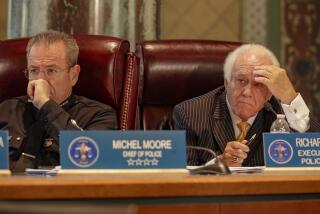The right approach to Airbnb in Silver Lake
The Times’ Walter Hamilton recently reported on the hackles being raised by Airbnb users in Silver Lake. The online service lets people become ad hoc innkeepers, offering all or part of their homes to travelers searching for temporary lodging. But neighbors are complaining about the noise, traffic and parking problems that have ensued.
They have a point, but that doesn’t necessarily call for a crackdown on Airbnb users.
Airbnb is just one of the new online platforms that have emerged to maximize the use of people’s assets or skills by efficiently matching buyers and sellers. An early example was EBay, which let anyone open an online storefront through which to do business. More recently, we’ve seen community transportation services such as Lyft, odd-job platforms such as Taskrabbit and crowd-funding tools such as Indiegogo and Kickstarter.
These platforms could be powerfully disruptive to established industries, which is why the successful ones often draw cries for greater regulation. Proponents of the rules say they’re needed to protect consumers and eliminate an unfair advantage that the new entrants enjoy. In many cases, though, the only ones looking for protection are the businesses that have to compete with the upstarts.
The right policy is not to create special rules for applications and services that threaten the established order; it’s to make sure existing rules make sense in the current technological and competitive environment.
Some might argue that online services shouldn’t be regulated at all, on the hands-off-the-Internet principle. There is a difference, however, between regulating business models (that is, how a business is carried out online) and regulating the effects of a business on a community.
For a transportation platform such as Lyft, the government has no legitimate interest in forcing the provider of the app to conduct business the way traditional fleet-based services do. Its interest is in ensuring consumer safety. As it happens, cities in California regulate taxi services because they let people hail rides spontaneously, in the street; the state’s Public Utilities Commission regulates limousines and other transportation services that offer prearranged rides. Hence the PUC’s tentative decision to require Lyft, Uber and similar app-based services to meet the same safety rules that apply to limos, including requiring drivers to pass background checks. Notably, although Lyft is clearly competing with Yellow Cabs, the state isn’t trying to force its business into the taxicab mold -- regardless of the demands from taxi companies.
Similarly, Airbnb participants compete with more conventional inn and hotel operators, but they’re not operating hotels and they shouldn’t be forced to conduct their businesses that way. For instance, it doesn’t make sense to require people who want to rent out their homes over Thanksgiving to meet the same accessibility requirements as a Holiday Inn. (I’ll leave open the question of whether government should require Airbnb to recruit people who could offer accessible accommodations.)
Yet even small inns are a potential nuisance to a neighborhood. That’s why cities have planning and zoning rules to regulate the effect those businesses have on the community around them. It seems appropriate for Silver Lake officials to consider how they might limit the frequency and intensity of Airbnb use so that it doesn’t enable an uncontrolled increase in residential density.
It’s worth remembering, though, that Airbnb is just a more efficient version of the old “room for rent” ads. And it shouldn’t be penalized just for that efficiency, given that the issues it raises -- congestion, noise, public safety -- are the same.
One potential legal challenge for Airbnb users is the local ban on property owners renting out space for less than a month in buildings not licensed as hotels. A judge in New York cited a similar state regulation -- enacted to stop apartment owners from running unlicensed hotels -- to outlaw Airbnb rentals there.
That’s a heavy-handed approach to the problems that Airbnb may pose. The better way is to look at how Airbnb users affect their neighbors, and adapt existing nuisance rules so that they apply appropriately. That’s how the PUC reacted to the new breed of transportation services, and it’s a useful model for dealing with other emerging platforms.
ALSO:
For a better GOP, start with better storytellers
Finally, on Syria, we’ve rediscovered the Constitution
Follow Jon Healey on Twitter @jcahealey and Google+
More to Read
A cure for the common opinion
Get thought-provoking perspectives with our weekly newsletter.
You may occasionally receive promotional content from the Los Angeles Times.











